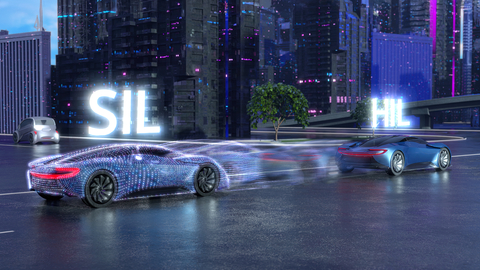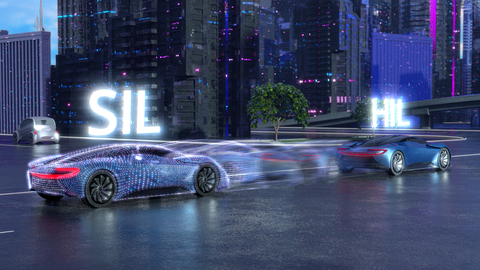WIXOM, Mich. & LAS VEGAS--(BUSINESS WIRE)--At CES 2025, dSPACE will show how software for electric, autonomous, and software-defined vehicles can be tested efficiently using end-to-end SIL and HIL solutions for simulation and validation. At booth #4500, dSPACE welcomes guests, presenting a comprehensive validation concept based on different test methods such as data replay and software-in-the-loop and hardware-in-the-loop testing. By seamlessly combining these test methods, safety-critical driving functions can be validated in earlier stages, leading to accelerated software development cycles.
Excellence in E-Mobility Testing
For decades, HIL simulators have been an integral means in the integration and validation testing of ECUs. Today, highly scalable SIL simulation enables functional and diagnostic testing in early stages, resulting in higher software quality. To ensure efficient and cost-optimized validation throughout the entire development process in both SIL and HIL contexts, software tools, models, and test artifacts must integrate seamlessly across all validation stages. At CES, dSPACE will showcase its test solutions for battery charging and battery management systems to introduce how to increase test efficiency by means of end-to-end SIL/HIL validation and reusing test cases, simulation models, bus and network configurations, and user interfaces, which allows for a seamless transition between test methods. The e-mobility demonstration will include charging a Cadillac Lyric of the EcoCAR student competition, which dSPACE has sponsored for over 15 years.
High-performance test software is needed to test fast power electronics circuits, such as those used in modern energy systems in electric cars or aircraft. With XSG Power Electronics Systems, dSPACE is the first supplier worldwide to present software that enables the simulation of highly dynamic switching frequencies of up to 1.5 MHz. This allows dSPACE to support the development of state-of-the-art power converters, which are becoming ever smaller, faster, and more powerful. Furthermore, dSPACE presents a new library for the FPGA-based real-time simulation of electric machines. The XSG Generic Drive model library uses a specially optimized generic algorithm to virtualize electric machines with 1 to 9 phases of any type and with any winding configuration. Within the simulation scenario, various non-linear effects such as spatial harmonics, cogging torque, or saturation can be considered in HIL as well as in Power HIL applications.
Autonomous Driving: High-Precision Tests in the Virtual World
In an exhibit showcasing dSPACE's work with autonomous technology leader Mobileye, dSPACE demonstrates how the closed-loop camera control serving closed-loop system tests can be efficiently performed in the lab during the development of Mobileye SuperVision™, one of the world's most advanced driver assistance systems. A SCALEXIO hardware-in-the-loop system simulates vehicle dynamics, bus communication, and traffic scenarios. Synchronously and with low latency, dSPACE AURELION and dSPACE ESI Unit simulate the video data from seven 8-megapixel cameras that are transmitted to the Mobileye development platform.
Continuous integration and continuous testing are crucial in vehicle development to handle increasing software complexity, ensure the highest safety standards, meet regulatory requirements, and shorten development cycles. At CES, dSPACE will therefore be demonstrating how software for autonomous driving can be developed and validated with the web-based, highly scalable software solution SIMPHERA for open and closed loop.
Software-Defined Vehicles: Scalable Integration Tests in the Cloud
E/E architectures, as used in software-defined vehicles, use high-performance control units (HPCs) to calculate complex functionalities and centralize hardware components. With VEOS, dSPACE offers the possibility of integrating HPC software execution environments into a software-in-the-loop (SIL) simulation. HPC software can be run on native ARM environments, such as Graviton instances from cloud provider AWS, and co-simulated with other virtualized components in VEOS. At the dSPACE booth, we will demonstrate how this approach can be used to stimulate infotainment systems or test distributed functions in the SDV architecture.
Cybersecurity Testing
Early-stage (shift left) cybersecurity testing is more important than ever. New automotive cybersecurity regulatory frameworks and standards, such as UNECE WP.29 R155 and ISO/SAE 21434, require cybersecurity to be addressed throughout the complete vehicle lifecycle.
dSPACE and PlaxidityX (formerly Argus Cyber Security) recently joined forces to introduce new cybersecurity test automation capabilities based on dSPACE HIL and SIL platforms as well as PlaxidityX Security. The joint solution provides ready-to-use fuzzing test cases for commonly used automotive bus and network protocols. It leverages PlaxidityX extensive experience in security architecture, risk assessment, and a deep understanding of vehicle architectures.
About dSPACE
dSPACE is a leading provider of simulation and validation solutions worldwide for developing networked, autonomous, and electrically powered vehicles. The company's range of end-to-end solutions are used particularly by automotive manufacturers and their suppliers to test the software and hardware components in their new vehicles long before a new model is allowed on the road. Not only is dSPACE a sought-after partner in vehicle development, but engineers also rely on our know-how at dSPACE when it comes to aerospace and industrial automation. Our portfolio ranges from end-to-end solutions for simulation and validation to engineering and consulting services as well as training and support. With more than 2,800 employees worldwide, dSPACE is headquartered in Paderborn, Germany; has three project centers in Germany; and serves customers through its regional companies in the USA, the UK, France, Japan, China, Croatia, Korea, India, and Sweden.




